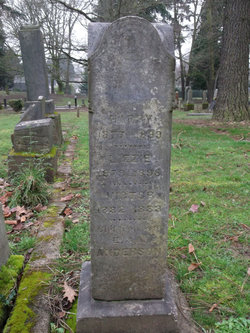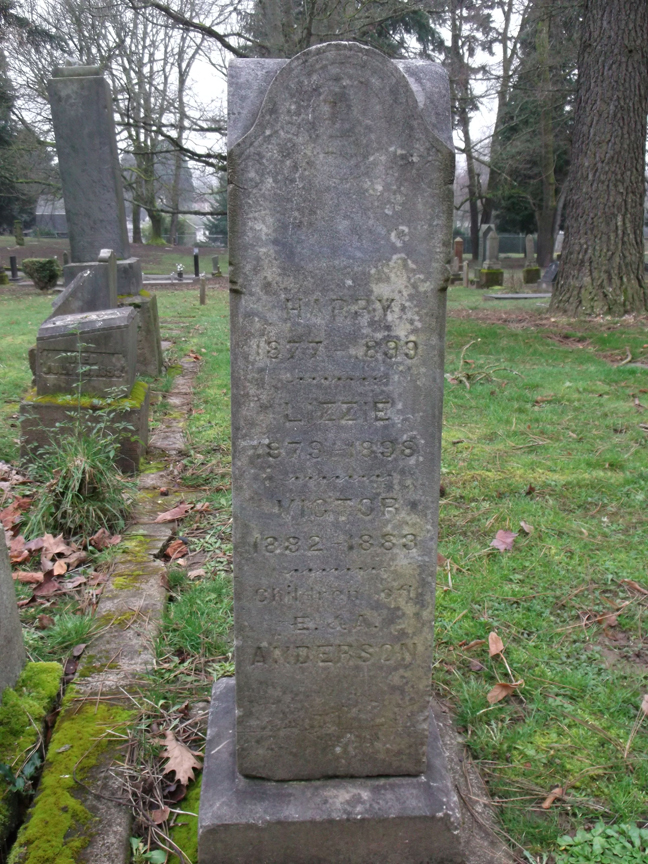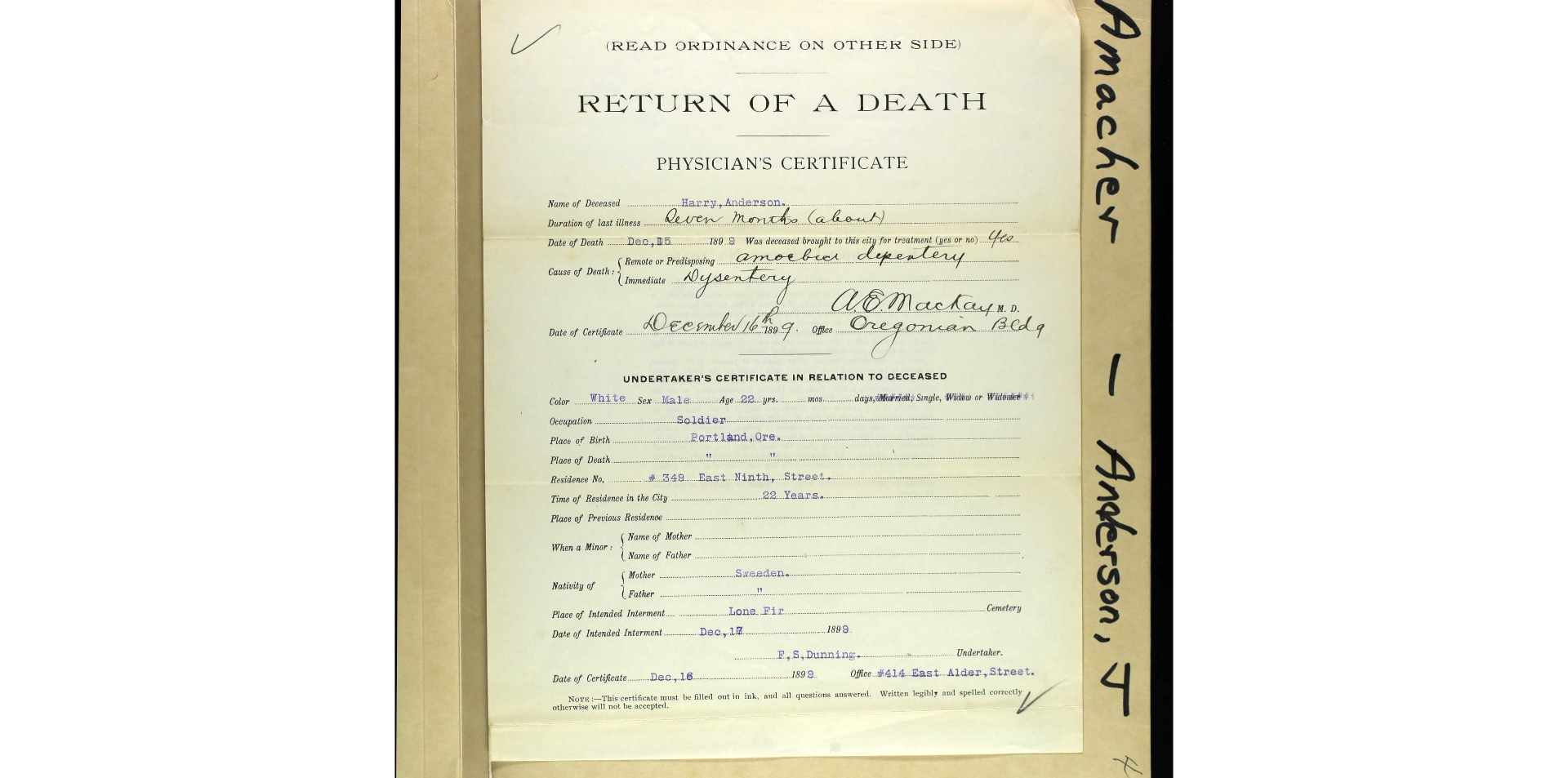MORNING OREGONIAN
DECEMBER 18, 1899 PG 5
HONORED DEAD SOLDIER.
FUNERAL OF SERGEANT HARRY ANDERSON
At the Centenary Methodist church, at East Ninth and East Pine streets, yesterday afternoon, the auditorium, which accommodates 1500 people, was comfortably filled, the occasion being the funeral services of Sergeant Harry Anderson, of Company E, Second Oregon, who died Friday forenoon. It was the first service of the kind since the Second Oregon returned from the Philippine Islands, and the outpouring of the people was an expression of sorrow for the dead soldier, actuated by a desire to accord him full honor. While he did not fall on the field of battle, the seeds of the disease which caused his death were planted while he was discharging his duties as a soldier. The members of the several Second Oregon posts in the city gathered at the hall of the Gilbert post, in the Ross building on Union avenue, and from there marched to the church in a body, headed by General Summers, and other officers. The firing squad from Company E, armed and in uniform, were placed on the front block of pews on the east side, while the sergeants, also attired in uniform were seated in front. In front of the chancel and pulpit the casket with the body of the dead soldier rested, draped with an American flag, and decorated with white lilies and other flowers. From many sources beautiful and costly floral pieces were sent.
The services were opened by the choir singing "Jesus, Lover of My Soul," when Dr. L. E. Rockwell read an appropriate selection from the Scriptures, ad offered an eloquent invocation in behalf of the dead soldier boy, and the cause for which he had given his life. Rev. W.S. Gilbert, ex-chaplain of the Oregon regiment, then gave a touching and eloquent address. Among other things he said:
"This is the first time we have been called together to honor a fallen comrade since we returned from far across the sea, and the surroundings here are very different from what they were in the Philippines, where we laid away many of our comrades in the far-off cemeteries. We gave Hutchinson to the keeping of the mighty deep, from the ship Sidney, and he was the first. As we consigned his remains to the keeping of old ocean we were overcome with the feeling that many more might yield up their lives before we should return to our native land. We then and there made a pledge that some time whoever should fall should finally rest in his native land. We remember today the very many of the Second Oregon whom we laid away in the cemeteries in the Philippine islands. We remember how we laid one away by the light of the candle, digging his grave and wrapping his form in a canvas, and placing his body where it could not be disturbed by the foe. And there was brave Harrington, of whom the commanding general said there never lived a braver man. At first we thought he only was sleeping, when one of his comrades discovered he was dead. Those funerals were different, indeed, from this one. Harry Anderson was a faithful soldier and performed his whole duty. While he did not yield up his life on the battlefield the seeds of the disease that carried him away were laid while he was in the discharge of his duty to his country and to his flag, and so we honor him the same. He never faltered. Nor did any member of the Second Oregon ever falter in the face of danger or duty. At Malabon, where the regiment accomplished what two regiments were expected to accomplish, General Wheaton said: 'The Oregon regiment has done its full duty today,' and so we treasure the remembrance of those words today with pride. It is the highest encomium that can be said of any man. And so Harry Anderson did his duty faithfully and well. To be able to take part in a great undertaking that has a great, sweeping influence on the age, shaping and changing its destiny, is indeed a great privilege, when we reflect that so many, many men pass through life without contributing anything to the good of humanity. So it was a great privilege to take part and be a part of that movement which carried our Christian civilization beyond the seas. Great sacrifices were made by Oregon homes in this movement that the light of liberty might be spread in the islands of the sea. It was indeed a great sacrifice our homes were called on to make. And in the death of Harry Anderson his parents and relatives gave a great deal. He went willingly, inspired by patriotism, and yielded up his life. And we can say to him: 'Harry, you were faithful; you did your whole duty, as a brave and faithful soldier. Sleep in peace.'"
At the close of the services the firing squa and officers of the posts first filed past the casket for the last look on the face of the dead soldier, and then the audience generally followed. On the outside a long procession escorted the remains to Lone Fir cemetery. Here, after final services, the firing squad fired the farewell salute over the grave of their comrade.
MORNING OREGONIAN
DECEMBER 18, 1899 PG 5
HONORED DEAD SOLDIER.
FUNERAL OF SERGEANT HARRY ANDERSON
At the Centenary Methodist church, at East Ninth and East Pine streets, yesterday afternoon, the auditorium, which accommodates 1500 people, was comfortably filled, the occasion being the funeral services of Sergeant Harry Anderson, of Company E, Second Oregon, who died Friday forenoon. It was the first service of the kind since the Second Oregon returned from the Philippine Islands, and the outpouring of the people was an expression of sorrow for the dead soldier, actuated by a desire to accord him full honor. While he did not fall on the field of battle, the seeds of the disease which caused his death were planted while he was discharging his duties as a soldier. The members of the several Second Oregon posts in the city gathered at the hall of the Gilbert post, in the Ross building on Union avenue, and from there marched to the church in a body, headed by General Summers, and other officers. The firing squad from Company E, armed and in uniform, were placed on the front block of pews on the east side, while the sergeants, also attired in uniform were seated in front. In front of the chancel and pulpit the casket with the body of the dead soldier rested, draped with an American flag, and decorated with white lilies and other flowers. From many sources beautiful and costly floral pieces were sent.
The services were opened by the choir singing "Jesus, Lover of My Soul," when Dr. L. E. Rockwell read an appropriate selection from the Scriptures, ad offered an eloquent invocation in behalf of the dead soldier boy, and the cause for which he had given his life. Rev. W.S. Gilbert, ex-chaplain of the Oregon regiment, then gave a touching and eloquent address. Among other things he said:
"This is the first time we have been called together to honor a fallen comrade since we returned from far across the sea, and the surroundings here are very different from what they were in the Philippines, where we laid away many of our comrades in the far-off cemeteries. We gave Hutchinson to the keeping of the mighty deep, from the ship Sidney, and he was the first. As we consigned his remains to the keeping of old ocean we were overcome with the feeling that many more might yield up their lives before we should return to our native land. We then and there made a pledge that some time whoever should fall should finally rest in his native land. We remember today the very many of the Second Oregon whom we laid away in the cemeteries in the Philippine islands. We remember how we laid one away by the light of the candle, digging his grave and wrapping his form in a canvas, and placing his body where it could not be disturbed by the foe. And there was brave Harrington, of whom the commanding general said there never lived a braver man. At first we thought he only was sleeping, when one of his comrades discovered he was dead. Those funerals were different, indeed, from this one. Harry Anderson was a faithful soldier and performed his whole duty. While he did not yield up his life on the battlefield the seeds of the disease that carried him away were laid while he was in the discharge of his duty to his country and to his flag, and so we honor him the same. He never faltered. Nor did any member of the Second Oregon ever falter in the face of danger or duty. At Malabon, where the regiment accomplished what two regiments were expected to accomplish, General Wheaton said: 'The Oregon regiment has done its full duty today,' and so we treasure the remembrance of those words today with pride. It is the highest encomium that can be said of any man. And so Harry Anderson did his duty faithfully and well. To be able to take part in a great undertaking that has a great, sweeping influence on the age, shaping and changing its destiny, is indeed a great privilege, when we reflect that so many, many men pass through life without contributing anything to the good of humanity. So it was a great privilege to take part and be a part of that movement which carried our Christian civilization beyond the seas. Great sacrifices were made by Oregon homes in this movement that the light of liberty might be spread in the islands of the sea. It was indeed a great sacrifice our homes were called on to make. And in the death of Harry Anderson his parents and relatives gave a great deal. He went willingly, inspired by patriotism, and yielded up his life. And we can say to him: 'Harry, you were faithful; you did your whole duty, as a brave and faithful soldier. Sleep in peace.'"
At the close of the services the firing squa and officers of the posts first filed past the casket for the last look on the face of the dead soldier, and then the audience generally followed. On the outside a long procession escorted the remains to Lone Fir cemetery. Here, after final services, the firing squad fired the farewell salute over the grave of their comrade.
Family Members
Advertisement
Explore more
Sponsored by Ancestry
Advertisement











